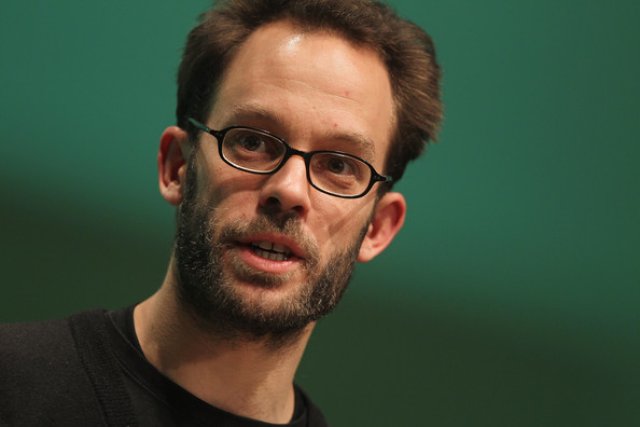
WikiLeaks has announced it will pursue legal action against disgruntled former employee Daniel Domscheit-Berg, whose recently released book, Inside WikiLeaks, slams Julian Assange's leadership and character in a series of allegations.
Some of the allegations appear serious. Others are hopelessly trivial.
Domscheit-Berg told AFP that Assange would "boast about how many children he had fathered in various parts of the world" and that Assange's "main criterion for a woman was simple. She had to be young. Preferably younger than 22." He also accuses Assange of being power-obsessed.
It’s important to note that Domscheit-Berg gives no evidence for these claims. But they have been widely reported by the world’s media.
"We used to be best friends, Julian and I," writes Domscheit-Berg. He goes on to criticise Assange's hygiene, complaining Assange would wipe his hands on his pants after eating.
Domscheit-Berg also bemoans occasions when Assange would drink the last of his hot chocolate or eat his canned meat.
While seemingly trivial, Domscheit-Berg's crusade against the WikiLeaks founder has worked to reinforce the hysterical claims of conservative American politicians who have taken issue with the publication of classified US military and government documents by WikiLeaks.
These claims also distract from more serious implications of comments made by Domscheit-Berg.
WikiLeaks dismissed Domscheit-Berg in September 2010. Since leaving, Domscheit-Berg has announced that he intends to launch his own WikiLeaks-style organisation, Openleaks.
Demotix.com reports that Openleaks was founded with the intention of being a "'neutral conduit', remaining transparent", and Domscheit-Berg notes that Openleaks would operate "without a political agenda".
In a February interview with ABC’s Four Corners, Domscheit-Berg said: “I think [Assange] was aiming at taking up the biggest fight possible, and that fight was by taking up a fight against the United States in that case as the biggest political player in the field.”
These claims by Domscheit-Berg imply a level of collusion between WikiLeaks and its sources to encourage provision of a specific type of leaked document, in this case relating to the US government or military.
He went on to claim WikiLeaks’ decision to release the US cables was an example of Assange’s “megalomania”.
Assange has repeatedly refuted claims that WikiLeaks has a specific political target. But WikiLeaks’ has taken a consistent political stance in favour of transparent power.
In a recorded video address to a February public meeting in Melbourne, Assange said: “We support a cause that is no more radical a proposition than that the citizenry has a right to scrutinise the state.”
Unlike most traditional news outlets, WikiLeaks’ stories are not commissioned, but rather leaked to it by sources that are unknown to the organisation.
"We don't 'go after' a particular country. We just stick to our promise of publishing material that is likely to have a significant impact," Assange told CBS News.
Recent WikiLeaks releases have been US military documents and diplomatic cables from US embassies. But it has also published information on suppression of free speech in Africa and Germany, the draft Copenhagen climate change agreement, and leaks about scientology, insider trading at JPMorgan and more.
Domscheit-Berg’s claim that his new organisation will not have a political agenda cannot be taken seriously.
He is critical of WikiLeaks’ decision to publish the leaked US cables simply because the US is such a big “political player”.
But US government secrets should be treated no differently from the secrets of other, less powerful, nations or institutions.
The decision by WikiLeaks to press ahead with publication does not prove Domscheit-Berg’s claims of Assange being characterised by “megalomania”. Rather, it shows WikiLeaks applies its ideals consistently.
Domscheit-Berg’s attacks have added to the tabloid-sensationalism surrounding the court proceedings Assange now faces in the UK, from where Sweden has sought to extradite him for questioning over sexual abuse allegations.
In a hearing in London on February 24, a judge ruled that Assange be extradited to Sweden. Assange will appeal the ruling.
WikiLeaks released a statement on February 25 saying: "Despite the recent events involving WikiLeaks editor-in-chief and spokesperson Julian Assange and its latest developments, WikiLeaks will go on as usual, cables will keep being published as we normally do."
Comments
Anonymous replied on Permalink
Anonymous replied on Permalink
Anonymous replied on Permalink
Anonymous replied on Permalink
Anonymous replied on Permalink
Anonymous replied on Permalink
Anonymous replied on Permalink
Anonymous replied on Permalink
Anonymous replied on Permalink
Anonymous replied on Permalink
Anonymous replied on Permalink
Anonymous replied on Permalink
Anonymous replied on Permalink
Anonymous replied on Permalink
Anonymous replied on Permalink
Anonymous replied on Permalink
Anonymous replied on Permalink
simongb@hotmail.com replied on Permalink
Anonymous replied on Permalink
Anonymous replied on Permalink
Anonymous replied on Permalink